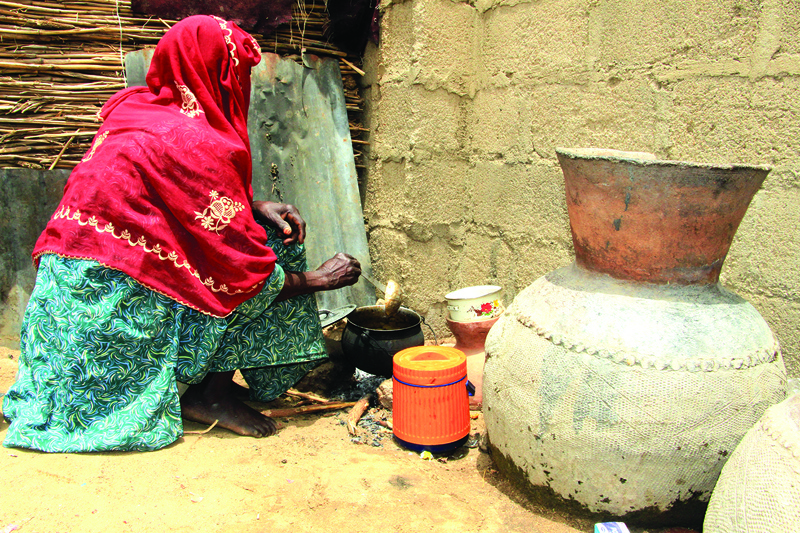 MAIDUGURI, Nigeria: In this file photograph taken on March 29, 2021, a woman cooks at Yawuri informal camp on the outskirts of Maiduguri, capital of Borno state. The makeshift camp hosts nearly 2,000 people internally displaced by a decade-long jihadist insurgency in northeast Nigeria. - AFP
MAIDUGURI, Nigeria: In this file photograph taken on March 29, 2021, a woman cooks at Yawuri informal camp on the outskirts of Maiduguri, capital of Borno state. The makeshift camp hosts nearly 2,000 people internally displaced by a decade-long jihadist insurgency in northeast Nigeria. - AFP
Maiduguri, Nigeria: Gaunt men sit in the shade sewing hats while women in headscarves cook leaves, watching children play as the dry wind blows through the thatched huts. It's a typical scene in the sprawling camps set up for over two million people who have fled jihadists waging war in northeast Nigeria-and where Aliyu, Abubakar, Muhammad and Mallam now also live.
But the desolate site is a far cry from where these four men had expected to end up after completing a government program to de-radicalize and rehabilitate Boko Haram fighters. The years since entering the custody of the authorities-time mostly spent in overcrowded and filthy cells-have been traumatic, the men say.
Now left to live in dusty camps with no jobs in sight, they say the government has not delivered the fresh start promised. The de-radicalization program has also targeted the wrong people, with participants saying that many civilians, rather than fighters, end up in the hands of the military. Over more than a decade, Boko Haram jihadists, along with combatants from dissident offshoot the Islamic State West Africa Province (ISWAP), have killed at least 40,000 people.
In response, Nigeria has launched military offensives and introduced Operation Safe Corridor in 2016 -- a program that would offer an exit route to militants willing to lay down their arms and embrace peace. Fighters officially are first screened and those deemed low risk are transferred to a center in Mallam Sidi, a town in northeastern Gombe state.
For six months, they are supposed to undergo vocational training, religious and basic education and receive psychosocial counseling. The United States, European Union and Britain have given millions of dollars to help the program, which is supported by the UN's International Organization for Migration (IOM) among others.
'Mistakenly' detained
Nigeria's armed forces coordinate the scheme, according to official documentation, with support from 17 groups including government departments, UN agencies and NGOs. "Operation Safe Corridor has recorded tremendous successes," its head, Brigadier General Mohammed Maina, said early last month in written responses to AFP's questions.
"Over 800 repentant ex-combatants have been successfully deradicalized, rehabilitated and reintegrated." Many more could soon be eligible. The army said earlier this month that 335 fighters who recently surrendered were "undergoing comprehensive security profiling." Yet the four men who participated in Operation Safe Corridor and were interviewed by AFP earlier this year gave a stark account of their experiences. Once in custody, they were held without charge in brutal conditions for several years before even reaching the rehabilitation scheme, they said.
And two of them, Abubakar and Mallam, said they were farmers-not former insurgents-who were wrongly detained along with many other civilians, including children. The individual stories of the four men could not be independently verified. But several reports including by the US Agency for International Development (USAID), International Crisis Group and Amnesty International have extensively detailed similar claims based on hundreds of interviews with others who have completed the program and officials.
In a report this year, Crisis Group said it had spoken to 23 people who had been through the scheme. "At most" a quarter of those at the rehabilitation center with them were "low-level but committed jihadist recruits," it said. "Most of the others... are civilians who fled areas controlled by Boko Haram and whom authorities then mistakenly categorized as jihadists and detained before sending them into Safe Corridor," the report said.
Maina denied that civilians were being sucked into the program, saying: "Ex-combatants are chosen after thorough profiling and investigation." Complicating matters further, a source with extensive knowledge of the program who spoke on condition of anonymity said that several dozen disengaged senior insurgents, including commanders, had also passed through the de-radicalization center, under a different scheme.
'We were trapped'
Abubakar, 48, said he earned a decent living as a farmer until Boko Haram fighters took control of his village in northeastern Borno state. AFP is not identifying specific locations or dates in this story to protect the participants' identity. All four of their names have also been changed. But, Abubakar said, when the Islamist extremists arrived, everything changed. "My income started reducing because they would take our crops... even the food we prepared," said the father of three.
"They were watching, monitoring us... we were trapped. There was no other way, they had guns." Mallam, 52, farmed peas, guinea corn and beans in a different village in Borno. When Boko Haram arrived there too, the men were told to grow beards and women forced to stay indoors. He said he once received 80 lashes because he bought cigarettes. Both farmers decided to escape with their families. "We left in the middle of the night... There were about 100 of us," said Abubakar, who had heard on the radio that the government was urging civilians to leave Boko Haram-occupied areas. Despite fearing capture by the insurgents, they felt they had little choice. - AFP
.jpg)



